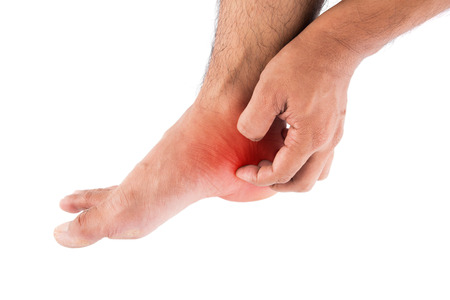Psoriasis Can Appear on the Feet
You have probably heard about a skin condition called psoriasis, but do you know that psoriasis can appear on the feet?
During August, we recognize Psoriasis Awareness Month as the perfect time to learn more about this serious skin disease that affects 7.5 million individuals in the U.S. Psoriasis is actually an autoimmune disease that causes white dead skin cells to accumulate on the skin. These appear as scaly, red patches that look like a rash.
Up to 20% of psoriasis sufferers will also have psoriatic arthritis, a complication that is a painful and joint-damaging form of arthritis.
Individuals with other autoimmune diseases can be more susceptible to psoriasis, and it can run in families too. There are many scenarios that can trigger psoriasis, including emotional stress, illness, very dry weather, recent sunburn or injury, and some medications.
Watch for These Symptoms of Psoriasis
Most commonly, individuals will have plaque psoriasis with red, dry patches of skin that can appear anywhere, including the feet. The patches are often itchy and sore and can be covered in silvery scales.
Palmoplantar pustulosis, a less common form of psoriasis, usually appears on the soles of the feet and the palms. With this condition, you may observe tiny, pus-filled blisters.
One note of caution: It is very easy to confuse psoriasis with athlete’s foot. Athlete’s foot is a very common and contagious fungal infection that is often found between the toes or under the nails. Psoriasis can be sore and painful, while the athlete’s foot is primarily itchy.
Because it is so easy to confuse the two, it is best to visit our office for a professional diagnosis and the right treatment for you.
How We Treat Psoriasis on the Feet
At this time, there is no cure for psoriasis. However, there are treatments available to relieve symptoms and also reduce the risk of a flare-up.
Treatments include:
Prescription oral and injected medications
Prescription topical oil, cream or ointment
Light therapy in which the problem area is exposed to ultraviolet light in a hospital or clinic
Some lifestyle changes can help reduce or prevent a psoriasis flare-up. Try maintaining a healthy weight and stopping smoking. Other changes that can help include exercising, reducing alcohol, keeping skin moisturized, using meditation or yoga to reduce stress, and keeping a symptom diary to pinpoint triggers.
Let Us Help with Your Psoriasis or Any Other Skin Condition
The foot specialists at PodiatryCare, PC and the Heel Pain Center have extensive experience in treating all aspects of foot problems. Our team of doctors which consists of Dr. Robert Marra, Dr. Thomas Johnson, Dr. Kristen Winters, Dr. Laura Vander Poel, and Dr. Matthew Tshudy is dedicated to serving you with all of the newest diagnostic and treatment technologies. Many treatments and surgeries can be handled right in our offices. Please call us at (860) 741-3041 to make an appointment in one of our offices in Hartford County, conveniently located in Enfield and South Windsor, CT.
